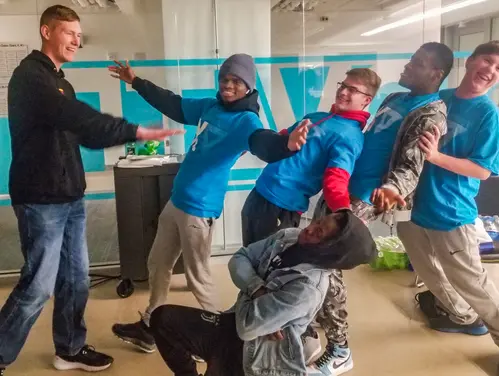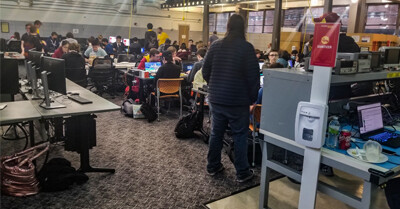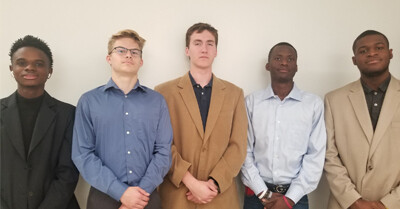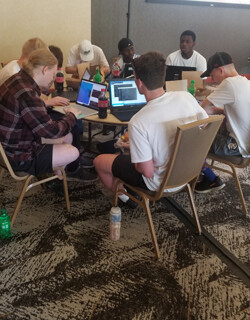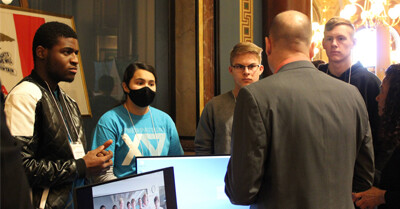If you get the chance to talk about cybersecurity education with Kyle Kuhlers from the Waterloo Career Center, take advantage. This veteran computer science educator is leading the way in providing opportunities for high school students to explore, experiment and gain experience and credentials in cybersecurity. And he’s ready to help other Iowa schools do the same.
Currently, Kuhlers teaches two classes focused solely on cybersecurity, where students have opportunities to learn how to best protect computer servers from online attacks using industry-standard programs, such as Netstat, John the Ripper and Wireshark.
From day one, interest in cybersecurity classes has been high at the career center, and this year, 20 students are involved in learning real-world, technical skills in this emerging field. Kuhlers foresees even more growth next year in the number of classes and students as the need for a future workforce in cybersecurity continues to increase.
“Cybersecurity is never going away as long as there are humans and computers,” Kuhlers said. “We need to make sure there are enough students in the technology pipeline to help protect our assets and information in the future.”
Careers in cybersecurity are in high demand in Iowa and across the nation. According to cyberseek.org – a site dedicated to data on the cybersecurity job market – over 755,000 cybersecurity job listings were posted in the U.S. in 2022, with nearly 6,050 listings from Iowa alone.
Cybersecurity has quickly become an important career path and area of study as technology continues to advance and intertwine with many aspects of our daily lives. The need to protect computer systems, personal information and other data is a real concern for most people, and including cybersecurity education into computer science curricula is a benefit for students as well as communities.
“Cybersecurity education is vital in creating a foundational understanding of how to stay safe online and up-to-date with the advances in technology that our students interact with on a daily basis,” said Justin Lewis, computer science consultant at the Iowa Department of Education. “It allows students, teachers and parents alike an opportunity to discuss and explore in a safe environment about data security and potential threats they may encounter.”
At the Waterloo Career Center, Kuhlers has worked with their information technology department to provide that needed safe space for students to explore and strengthen their cybersecurity tactics. A closed network, separated from the main network for the school district and center, allows students a safe environment to practice, make mistakes, find solutions and build confidence, which Kuhlers sees as a key part of the learning experience.
“Curiosity and confidence are extremely important to learning in the cyber world,” he said. “Kids are naturally curious, and you can use that curiosity to help build their confidence in a positive way in learning cybersecurity.”
Students in Kuhlers’s classes learn how to both attack and defend computer servers through password breaking, network scanning, phishing and more. By understanding how to attack a system, students can identify where the weak spots are in a system and how to best defend them.
“In order to defend the system, we teach a lot of attack skills,” Kuhlers said. “It’s important to stay abreast to the latest types of threats in the cyber world and practicing attacks can help us do that.”
Career center students not only have opportunities to learn cybersecurity tactics in Kuhlers’s classes but also have chances to earn industry-recognized credentials, which can lead to high-earning cybersecurity careers right out of high school.
Certifications such as the ITS Introduction to Cybersecurity, CompTIA ITF+, CompTIA A+ and CompTIA Security+ are offered through the cybersecurity classes with Kuhlers and are seen as a bonus with students.
“In my first semester, I earned a Microsoft security certification,” said senior Hogan Fuessel, 18. “I'm also preparing to take the CompTIA Security+ certification test in May, which will be more strenuous but will qualify me for a lot of entry-level positions in cybersecurity.”
Hogan, a student from neighboring Cedar Falls High School, attends the Waterloo Career Center specifically for the cybersecurity education opportunities.
“I had a friend who came here last year for cybersecurity and told me I should look into it,” he said. “I’ve always had an interest in a computer and technology career path, and cybersecurity was something I wanted to try.”
Similarly, Waterloo West High School senior David Ansimbanda, 17, has been interested in computer science since his sophomore year and has expanded his interests into cybersecurity.
“Too many things out there are not secure,” he said. “This class has helped me a lot in understanding network security. If you’re going into the cybersecurity field, this class is very helpful.”
Along with the center’s classes, both Hogan and David have expanded their experiences and learning by participating in the center’s cybersecurity club, headed by Kuhlers. The cybersecurity club offers students the opportunity to compete in intense team competitions like CyberPatriot, CyberForce and more, which develop not only technical skills but also professional skills like teamwork, leadership and communication.
“Last fall, we went to Chicago for the CyberForce competition where we had to set up and secure different servers,” Hogan said. “We had to work together to make a website secure enough to counter attacks into the server.”
After graduation this spring, both Hogan and David will expand their education and career paths towards cybersecurity at college. Kuhlers hopes this is a path that can be offered to many other Iowa students, and he wants to spread the keys to success with educators across the state.
“Come to the Computer Science Professional Development (CS PD) Week in June,” he said. “I will be sharing three different curriculums on cybersecurity and will show how I build my curriculum from these three resources.”
Sponsored by the Department, 2023 CS PD Week will be held June 12-16 at the University of Northern Iowa in Cedar Falls and will feature different professional development opportunities in Iowa's growing computer science field. More details on CS PD Week will be released in the future, and any Iowa educator interested in computer science and cybersecurity is encouraged to attend. Through this event, Kuhlers hopes to get more teachers and administrators excited – and less nervous – about cybersecurity education.
“We have to build teacher confidence in cybersecurity,” he said. “It’s ok to have students smarter than you in the room. You just need to provide good foundational basics and help work out problems. From there, students can fly. You want them to leave the class knowing ten times more than you.”
Subscribe to receive email updates from the Iowa Department of Education.
